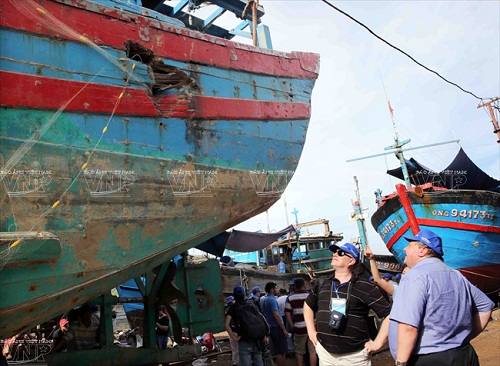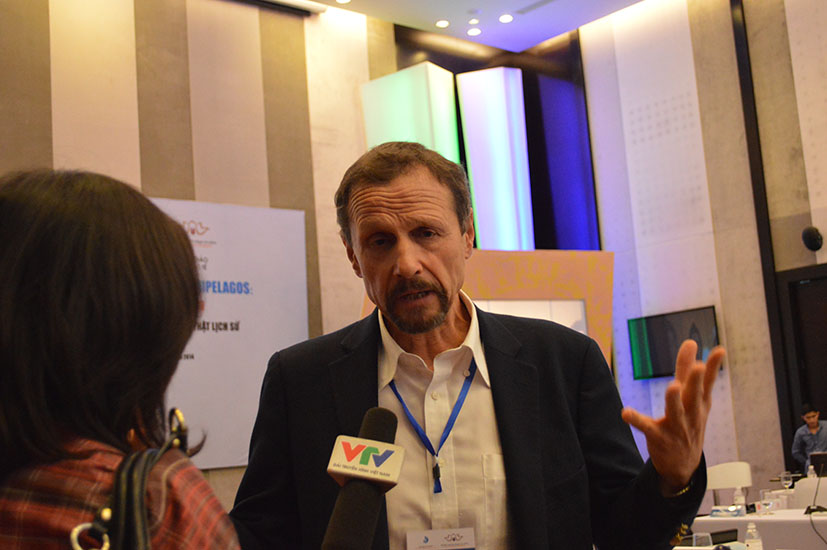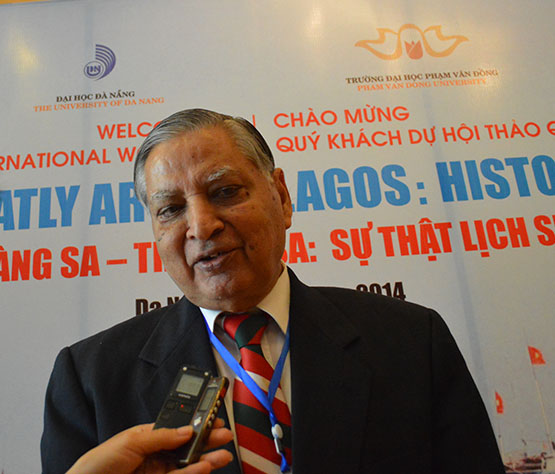|
Deploying more oil rigs,
On the sidelines of the international
conference on Hoang Sa (Paracel), Truong Sa (Spratly) Islands in

On June 21, 2014 the delegates who
attended the International Workshop under the theme "Paracel and Spratly
Archipelagos: Historical Truths" held in
Prof. Nguyen Quang Ngoc, deputy
chairman of the
The deployment of additional oil rigs in the
It will not deploy just one oil rig but many other oil
rigs, more airports and will occupy more areas to gradually turn the
Mr. Leszek Buszynski, from the

It is likely that after 15/8 when
Of course the international community will condemn
them, warning that
Advisor for strategic issues of the
Southeast Asia Research Group, Subhash Kapila:

The new move of sending new oil rigs to the
They hope that by bringing in more oil rigs, they will
reinforce their claims of sovereignty over the
Mr. Gerhard Will, expert of
Southeast Asia and Asia of the German Institute for International and
Security Affairs - SWP:
This is a move to increase tension, contrary to the
long-term economic interests of the
The information about deploying additional drilling
rigs in the
Prof. Renato de Castro of the De la
Salle University, the
If the first oil rig is targeted directly to
They will push
Professor Eric Franckx from
Université Libre de Bruxelles, Belgium
If the oil rigs are deployed to different areas of the
So I think the Chinese are raising difficulties for
themselves when they make such moves. Such workshops will be held in
According to Reuters,
Coordinates posted on the website of China's Maritime
Safety Administration showed the Nanhai number 2 and 5 rigs had been deployed
roughly between southern
The agency did not say who owns the rigs.
Earlier this week, it gave coordinates for a fourth
rig, the Nanhai 9, which it said would be positioned just outside
The Global Times, a popular tabloid published by the
Communist Party's official People's Daily, quoted Zhuang Guotu, director of
the Center for Southeast Asian Studies at Xiamen University, as calling the
rig deployment a "strategic move".
"The increase in oil rigs will inevitably jab a
sensitive nerve for
It was unclear if the four rigs were part of those projects.
A CNOOC spokesman declined to comment, but the company has long said that in
a bid to boost production it wanted to explore in deeper waters off
CNOOC has said it would increase by up to a third its
annual capital spending for 2014 to almost $20 billion. Reuters
Scholars suggest ways to counter
As
International scholars, including those from the
Their presentations made it clear that the Vietnamese
state has established and exercised its sovereignty over the Hoang Sa
(Paracel) and Truong Sa (Spratly) archipelagos peacefully and constantly and
in line with international law for centuries.
They once again criticized
General Daniel Schaeffer, former French military
attaché to
Defying international law,
The ‘nine-dash line’ claim is no longer just a matter
of particular concern of only one country in the region, but now is of utmost
concern to the international community. An international consensus should be
reached to ask
Professor Jerome Cohen from New York University’s
School of Law recommended that like the Philippines, Vietnam should sue China
into the International Tribunal for the Law of the Sea, because the nine-dash
line runs counter to the 1982 UN Convention on the Law of the Sea (UNCLOS).
Professor Eric Franckx from Université Libre de
Bruxelles,
The convention was signed by many countries, including
Professor Carlyle A. Thayer from the
As a world power,
Scholar even affirmed that it is unacceptable if any
party uses force to change the status quo, destabilize the region and violate
sovereignty of another nation, in its attempt to take control of the
VOV
|
Thứ Hai, 23 tháng 6, 2014
Đăng ký:
Đăng Nhận xét (Atom)
Không có nhận xét nào:
Đăng nhận xét